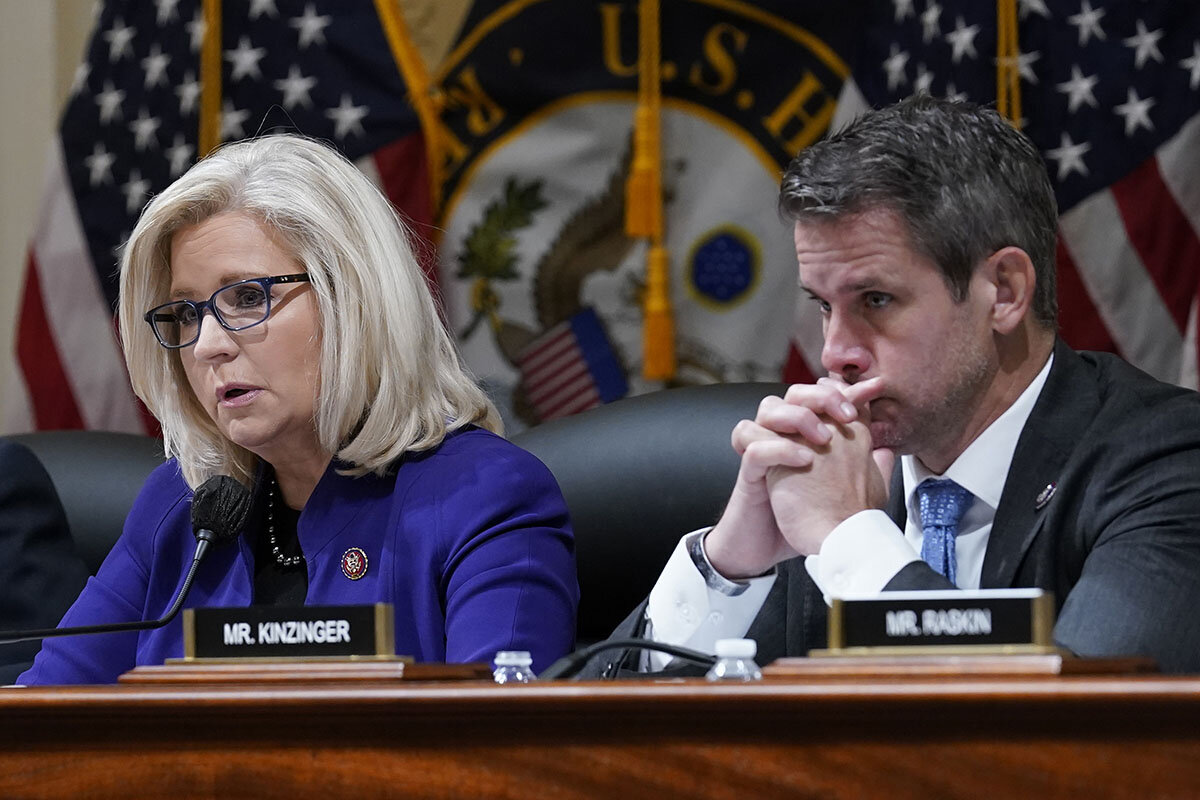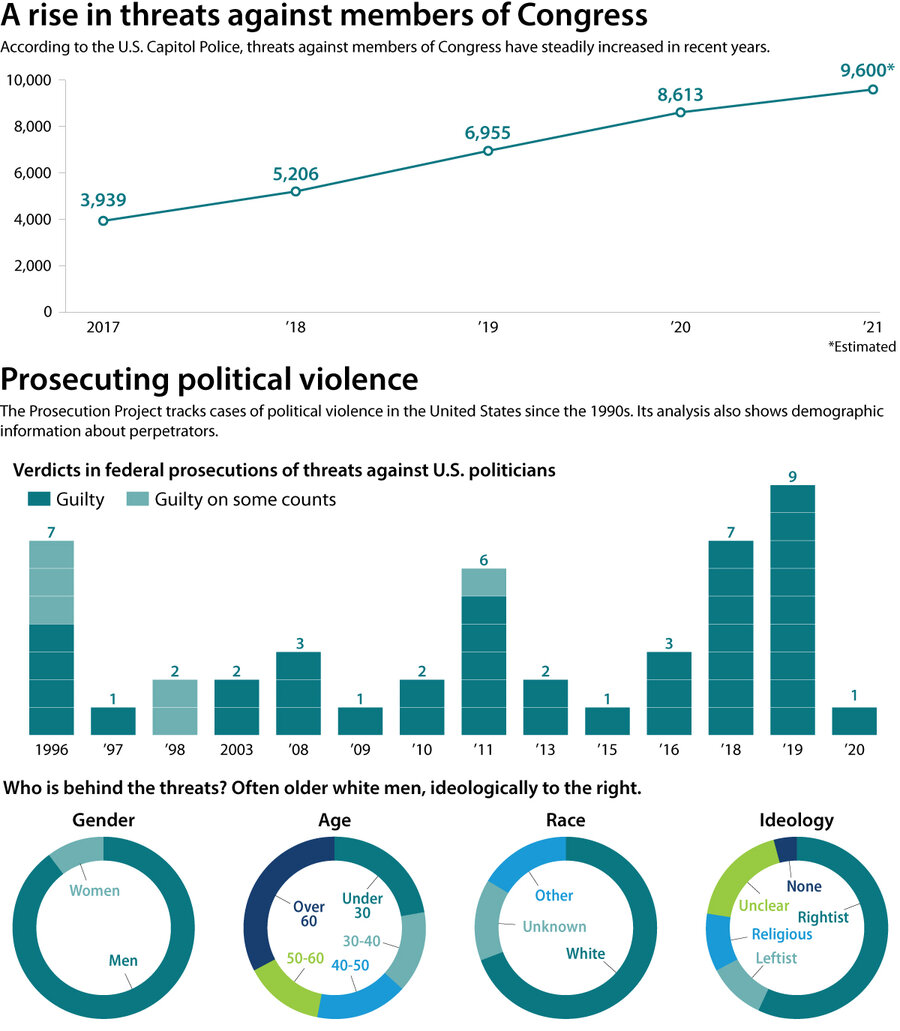- Quick Read
- Deep Read ( 16 Min. )
Monitor Daily Podcast
- Follow us:
- Apple Podcasts
- Spotify
- RSS Feed
- Download
TODAY’S INTRO
A Monitor guest: Ukrainian Ambassador Oksana Markarova
Oksana Markarova became Ukraine’s ambassador to the United States just a year ago. Her job, an already challenging one amid rising concern about Russian aggression, soon took on monumental proportions. Russia invaded Ukraine – and Ambassador Markarova was charged with managing one of her country’s most crucial relationships.
But to hear her talk about her role in this pivotal moment is not to hear about its weight. “It is no longer work,” she told a group of Monitor writers and editors Saturday at the annual Gridiron Club dinner in Washington, where she was the Monitor’s guest. It is “everything” – a mission, and one in which she and President Volodymyr Zelenskyy, with whom she talks frequently, inspire each other. “He cheers us up,” she said, referring to embassy staff.
Ambassador Markarova (pronounced Mar-KAR-ova) has felt the war’s pressures on all fronts. In Washington, she is ubiquitous, meeting officials, doing interviews, rallying support. Her four daughters are in the U.S.; one is a new mother. The ambassador’s husband is in Ukraine, as are her in-laws. On a day when grim reports emerged about the destruction left by retreating Russian forces north of Kyiv, she told us her in-laws’ house had been destroyed.
The annual Gridiron dinner, hosted by journalists, brings together hundreds of prominent politicians, diplomats, and business leaders for good-natured political humor and skits. Ambassador Markarova gracefully navigated the many people eager to talk with her, be it about the war or her striking (Ukrainian) turquoise necklace. She received a standing ovation as the dinner began, and held her hand over her heart in appreciation. At a time of strain in many democracies, she heard Gridiron’s president remind the assembly of their shared belief in “the transcendental promise of this country,” and his exhortation to journalists to “keep telling the story of democracy.”
We hoped she felt a touch of the inspiration President Zelenskyy has offered his country. Amid deep global uncertainty, the importance of foundational values was front and center. So too was the club’s mission of good fellowship – and humor. So we were delighted that as she left, Ambassador Markarova told my colleague Linda Feldmann that she loved the evening: “It was the first time I’ve laughed” since the invasion.
Share this article
Link copied.

Help fund Monitor journalism for $11/ month
Already a subscriber? Login

Monitor journalism changes lives because we open that too-small box that most people think they live in. We believe news can and should expand a sense of identity and possibility beyond narrow conventional expectations.
Our work isn't possible without your support.
A deeper look
Traitor or scapegoat? How one cop became the face of Jan. 6.
He was initially charged with the equivalent of trespassing, but T.J. Robertson has spent nine months in solitary confinement. His trial, scheduled to begin April 5, shows how the Jan. 6 Capitol assault reverberates among families and throughout America.

As the House Select Committee investigating Jan. 6 continues to interview key witnesses, the Department of Justice is prosecuting individuals who participated in the attack on the U.S. Capitol. More than 775 defendants have been arrested so far; 244 have pleaded guilty, while two have been convicted by trial. The rest are still waiting.
Thomas “T.J.” Robertson, whose trial begins this week, is one of them. For much of the past year, Mr. Robertson has been in jail. Facing mostly misdemeanor charges, he was remanded in July after violating his conditions of release, with the judge citing posts on social media as evidence that he’d been “further radicalized by his pending prosecution.”
Mr. Robertson, who has been terminated from the Rocky Mount Police Department in southwest Virginia, strongly rejects the idea that he has been “radicalized.” The prosecution has not linked him with any extremist groups, and he has not been charged with seditious conspiracy – the most serious offense reserved for members of the Oath Keepers and Proud Boys, whom the government accuses of planning the assault on Congress.
But as a former police officer who “hasn’t had even a speeding ticket since the late 1990s,” he can envision ripple effects from the Jan. 6 prosecutions – especially among those who are veterans, police officers, or both, like himself.
“I am going to turn 50 and I have been shot on multiple continents and here I am, in my opinion, being politically persecuted,” says Mr. Robertson, in a Skype interview at the Central Virginia Regional Jail in Orange, where for the past nine months he has spent 23 hours a day in solitary confinement for his own protection.
Traitor or scapegoat? How one cop became the face of Jan. 6.
Samantha Robertson spots a broken railing on the front porch, and mentally adds it to an ever-growing list of chores for her husband to tackle when he comes home. Beneath the cracked rail is a neat line of men’s combat boots, unworn for the past nine months.
For much of the past year, Ms. Robertson’s husband, T.J., has been in jail, charged with a felony related to the Jan. 6 attack on the U.S. Capitol. She’s been living alone in their single story house at the end of a mile-long gravel road at the base of the Blue Ridge Mountains. A menagerie of goats, chickens, and German shepherds roams around the backyard.
Ms. Robertson is relieved the waiting will finally be over when his trial begins this week – but she’s not really expecting closure. Because regardless of when her husband returns, she knows their lives won’t be the same.
Thomas “T.J.” Robertson – along with fellow police officer Jacob Fracker, who went with him to the Capitol that day – was terminated from the Rocky Mount Police Department in southwest Virginia a few days after he got home. If convicted of a felony, he will never be allowed to own a gun again. He will also lose his Veterans Affairs benefits, which have been helping pay their home mortgage. Already, Ms. Robertson has been working several odd jobs over the past year to make ends meet amid the family’s accumulating legal fees.
But in some ways, it’s the personal impact she’s most worried about. Mr. Fracker used to jokingly call T.J. “Dad” – but last month he incriminated Mr. Robertson in a plea agreement with the government. Married for less than three years, Ms. Robertson doesn’t know when she and her husband will be able to resume the fertility treatments they’d started before he went to the Capitol. And she wonders how long reporters and curious folk will continue coming down their drive to see the home of one of the most publicized Jan. 6 cases.

“There’s always going to be a stigma associated with it,” says Ms. Robertson, feeding the couple’s goats as a half-dozen dogs whine for her attention. “Even the people who didn’t do anything. ... You’re just going to be looked at as an individual that went [to the Capitol], and therefore you’re an immoral individual.”
As the House Select Committee investigating Jan. 6 continues to hold hearings and interview key witnesses, the Department of Justice is simultaneously prosecuting individuals who participated in the attack. More than 775 defendants have been arrested in almost all 50 states so far, with the list continuing to grow. According to a database maintained by George Washington University, 244 defendants have pleaded guilty, while so far two have been convicted by trial. The rest, like Mr. Robertson, are still waiting.
Most, however, are waiting at home. Mr. Robertson is one of around 65 who are currently in jail, having been remanded by a judge last July after violating his terms of release.
Which means that for scores of families like the Robertsons – and communities like Rocky Mount – the full fallout from that unprecedented day is yet to come. What took place at the U.S. Capitol on Jan. 6 was, for many participants, the culmination of years of frustrations. But it may also turn out to be the catalyst for an even deeper set of grievances.
“I am going to turn 50 and I have been shot on multiple continents and here I am, in my opinion, being politically persecuted,” says Mr. Robertson in a Skype interview. For the past nine months, he has been incarcerated at the Central Virginia Regional Jail in Orange, where he spends 23 hours a day in solitary confinement for his own protection, because of his decades as a police officer.
“It’s so ridiculous to think that I served my whole life on behalf of the government,” he says, before trailing off.
Jan. 6 still reverberates
On a national scale, the events of Jan. 6 are still sowing divides within the Republican Party. In early February, the Republican National Committee censured the two GOP lawmakers serving on the House Jan. 6 committee for “participating in a Democrat-led persecution of ordinary citizens engaged in legitimate political discourse.” Across the country, rallies and fundraisers have been organized for the “political prisoners” of Jan. 6. Former President Donald Trump’s unsubstantiated claim that the 2020 election was stolen continues to shape GOP primary races ahead of the 2022 midterm elections.

Mr. Robertson, who voted for Mr. Trump twice, now professes himself somewhat disillusioned with the former president, calling him a “loudmouth.” But to this day, he harbors doubts about the 2020 election.
On Jan. 6, 2021, those doubts brought Mr. Robertson, who has a framed copy of the Constitution hanging in his living room, to Washington.
“I went there because I genuinely believe that there were election irregularities that needed to be fixed,” says Mr. Robertson, wearing an orange-and-white striped jumpsuit. “You have 19 bellwether counties that every president has won, for all of history, and Trump won 18 of those,” he says, repeating a point made by the former president himself – which experts say is accurate but has no bearing on claims of fraud, which were rejected by numerous courts.
Mr. Robertson says he walked into the Capitol peacefully on Jan 6. Before entering, he says, he asked an officer if it was all right – and was told it was fine, as long as he avoided restricted areas. He says that’s what he did: He walked in, took a selfie with Mr. Fracker in the crypt, and walked out. He was inside, he says, for less than 30 minutes.
The criminal complaint filed just days after the Capitol attack includes the now-infamous selfie, in which Mr. Fracker is making an obscene gesture, and Mr. Robertson’s Facebook posts about the event. Initially, the U.S. Attorney’s Office for the District of Columbia, which declined to comment for this article, charged Mr. Robertson with four counts: three misdemeanors and one felony – obstruction of an official proceeding.
David Alan Sklansky, a criminal justice expert at Stanford University, calls those initial counts “about the lowest level, most basic charges you can imagine for conduct on Jan. 6.” Three of them, he says, “are literally trespassing.”

“The more serious cases are the ones who brought guns to the Capitol or who are charged with assaulting the police,” says Stephen Saltzburg, a professor at George Washington University Law School. “There is none of that here. Don’t get me wrong, there are some judges on the court who are going to say, ‘Anyone who was involved in the attack on the Capitol, that’s serious.’ But there are others who will say, ‘Come on, these charges don’t amount to more than serious trespassing.’”
Then, in the days following his arrest and termination from the Rocky Mount Police Department, Mr. Robertson posted a slew of violent threats online. The “next revolution” started on Jan. 6, he wrote, warning that “peace is done” and now is the time to “buckle armor or just stay at home.” Over the course of one month, Mr. Robertson ordered more than a dozen firearms online, totaling more than $12,000 – a violation of the conditions of his release.
“They are trying to teach us a lesson,” wrote Mr. Robertson on a Gunbroker.com chat forum. “They have. But its definitely not the intended lesson. I have learned that if you peacefully protest than you will be arrested, fired, be put on a no fly list, have your name smeared. ... I have learned very well that if you dip your toe into the Rubicon ... cross it. Cross it hard and violent and play for all the marbles.” (Editor’s note: The original spelling has been left intact.)
The FBI got a warrant to search the Robertsons’ home in Ferrum and found what agents said “appears to be a partially assembled pipe bomb” in a box with a label that “included the words ‘Booby Trap.’”
“His recent social media posts may contain elements of bravado and hyperbole, but they provide evidence that Robertson is sympathetic to calls for a violent ‘revolution,’ and has been further radicalized by his pending prosecution,” wrote Judge Christopher Cooper in a July order revoking Mr. Robertson’s release and sending him to jail until his trial.
Experts on far-right extremism say that a sense of martyrdom can sometimes become a catalyst for further violence, both for the individual who feels wronged as well as others who feel inspired by them. Perceived martyrs often “become a sort of rallying cry,” says Don Haider-Markel, a political science professor at the University of Kansas.
Timothy McVeigh’s anger over the Waco standoff in 1993, which resulted in the deaths of 76 people including 25 children, spurred him to carry out the Oklahoma City bombing two years later – the deadliest act of domestic terrorism in U.S. history. One year after the bombing, the number of militia groups in the U.S. spiked to an all-time high.
“Of course law enforcement has to intervene when people are engaged in criminal activity, but what that tends to do is the people who are loosely affiliated tend to drift off and drift away, while those who are committed tend to go even deeper underground,” says Mr. Haider-Markel. “That’s what we worry about.”
“That’s the Facebook guy”
Mr. Robertson says he was in a dark place when he got home from the Capitol. He had lost his job. Every time he logged onto Facebook there were messages from strangers telling him to “rot in hell.”
“That’s the Facebook guy, not the real guy,” says Mr. Robertson of his angry social media posts. “I talked myself into this. But the person who talked himself into this was upset and getting messages and drinking.”
He says he decided to bide his time by filling out his World War II gun collection and had them delivered to another FFL (federal firearms license) owner in Roanoke where he planned to pick them up when legally able. Court documents show his online purchases included rifles from the 1940s and ’50s; according to one gun shop proprietor, none of the guns on the list would count as modern.
As for the partially assembled pipe bomb, the FBI’s photos show that the full label on the box reads “ALERRT kit, props and boobytrap sims.” ALERRT is a law enforcement training program for which Mr. Robertson is listed as a certified instructor. Mr. Robertson says what the FBI found was actually a prop for training (“sims” being short for “simulations”).
The components of the box are “very consistent” with pipe bomb props that an ALERRT instructor would use, says ALERRT Assistant Director John Curnutt. “We want props to be as realistic as they can sound, look, and feel to thoroughly teach how to manage the stress and fear of an active shooter event,” says Mr. Curnutt.

Mr. Robertson strongly rejects the idea that he has been “further radicalized” by the events of the past year, as the judge suggested. But as a former police officer who “hasn’t had even a speeding ticket since the late 1990s,” he can envision ripple effects from the Jan. 6 prosecutions – especially among those who are veterans, police officers, or both, like himself.
“You’re taking people who have lived their whole life under the law and were part of protecting society, and you are ripping that identity away from them ... making them pariahs in their community,” he says. “You are going to eventually release them – and you are counting on the least stable of them not to be radicalized?”
At least 100 individuals charged in the Capitol attack have military experience, according to the George Washington University database, about 13%. That’s “statistically higher than what you would expect,” says Andrew Mines of GW’s Program on Extremism, given that roughly 7% of all Americans are veterans. According to Mr. Mines, almost 30% of those military arrestees had some affiliation to domestic violent extremist groups like the Proud Boys or the Oath Keepers.
Veterans are “prized recruits” for extremist groups because of their combat and weapons training, says an October 2021 report by the House Committee on Veterans’ Affairs. For some veterans, experts say, these groups offer a sense of brotherhood like they had in the military. “The camaraderie of having a small group of people who you depend on for your life – militia groups help re-create that,” says Mr. Haider-Markel.
Mr. Robertson joined the U.S. Army in 1990. Over the next several years, he graduated from Ranger and sniper school while earning his civil engineering degree from Virginia Tech, taking some of his classes at Fort Bragg. Around 2000, he joined the Army Reserves and began a more than two-decade career with the Rocky Mount Police Department – spending 18 months between 2007 and 2008 in Iraq as a sniper.
During this time, he married his first wife and had two children: a daughter and a son. Mr. Robertson says his children, now young adults, are handling his detention all right, having grown accustomed to his absence during the years he spent abroad in the military when they were young.
Two years after his tours in Iraq, Mr. Robertson went to Afghanistan as a Department of Defense contractor, serving as an embedded tactical trainer for the Afghan army. In September 2011, he was seriously wounded from being shot in the leg and hit with shrapnel from surrounding mortars. Back in Virginia, he underwent almost a dozen surgeries before rejoining the Rocky Mount P.D.
The prosecution has not linked Mr. Robertson with any far-right extremist groups in court documents, and Mr. Robertson says he has no connection with any. Nor has he been charged with seditious conspiracy – the most serious offense the Department of Justice has reserved for members of the Oath Keepers and Proud Boys whom the government accuses of planning the assault on Congress.
And the same personal history that prosecutors point to as cause to take his online threats seriously makes Mr. Robertson’s friends incredulous at the notion that he would ever do anything at the Capitol other than protest.
“The guy has spent his entire adult life serving his country,” says Mark Whitefleet, who worked with Mr. Robertson as a fellow Rocky Mount police officer before he left the field a decade ago, speaking from his kitchen. Service flags and medals hang on the wall behind his head; a rolled up Blue Lives Matter flag leans against his doorway.
Many are equally incredulous that America won’t listen to their claims of election fraud – despite the fact that those claims have been refuted by numerous recounts, audits, and court rulings.
“I’ve got over 15 ribbons and badges from Iraq and so does T.J. You’re telling me we’re all wrong?” says George Bobbouine, a fellow veteran who worked alongside Mr. Robertson at the Rocky Mount Police Department for over a decade before he retired in 2018.
Mr. Bobbouine had initially planned to go to Washington on Jan. 6 with Mr. Robertson and Mr. Fracker but wound up having to cancel for emergency dental surgery.
“Because I’m a cop”
Last month, Mr. Fracker, who declined to be interviewed, accepted a plea deal. He pleaded guilty to one charge of conspiracy and promised to cooperate with the government’s investigation.
His statement of offense says Mr. Robertson brought gas masks to the Capitol and “a large wooden stick or club,” which he used to impede officers’ paths. Mr. Fracker’s plea resulted in prosecutors upgrading two of his former trespassing misdemeanors to felonies. Mr. Fracker also claims that Mr. Robertson used the stick to impede officers’ paths – adding a fifth charge, a felony. After the men were served arrest warrants in Rocky Mount, Mr. Fracker says Mr. Robertson destroyed both of their phones – a claim that has added a sixth charge, and another felony, to Mr. Robertson’s case.
Mr. Robertson says he brought gas masks because of scenes of pepper spray he had seen during the 2020 Black Lives Matter protests. The stick, he says, was his walking stick – which several friends say he often carries when walking long distances due to his combat injuries. As for the phones and destruction of evidence, he says it was Mr. Fracker who did that.

Mr. Robertson and his supporters believe the government and the media are treating many Jan. 6 defendants unfairly – but none more so than him. When asked why, he looks left and right before putting his hand over the receiver to cover his mouth so other inmates can’t read his lips.
“Because I’m a cop,” he whispers.
“If you want to hold me to a higher standard, you can,” he says. “Hold me to trespassing – I did that. I will do my time. But they are really, really trying to paint me into being something I’m not.”
Dennis Deacon, who recently retired after serving as police chief in nearby Boones Mill for almost a decade, has known Mr. Robertson for 30 years and served as best man at his first wedding. He says Mr. Robertson often enjoyed talking politics with friends at Bojangles over biscuits and coffee – but he never got riled up about it.
“I don’t think I’ve ever seen him mad. He’s been in the middle of fights and shootings, and he don’t get mad,” says Mr. Deacon at his home in Callaway, his dog Roxy chewing a bone at his feet. “So I don’t think ‘radicalized’ has anything to do with T.J. I think [it’s more] ‘disappointed in the system and watching our country.’”
“You can’t deny that there are major shifts,” he adds. “Just look at what happened in Portland.”
They seemed like “the nicest people”
Many allies of Jan. 6 defendants point to the riots and looting in places like Portland, Oregon, and Kenosha, Wisconsin, in the summer of 2020 following the murder of George Floyd as an example of how offenders on the left and right are treated differently.

To local hairdressers Bridgette Craighead and Faatimah Ziegler, the difference between the summer of 2020 and the violence at the Capitol comes down to what the groups were protesting: centuries of racism versus a free and fair election in which one candidate refused to concede. Speaking while conditioning and combing the hair of two young Black women sitting in styling chairs, Ms. Craighead and Ms. Ziegler say Mr. Robertson’s status as a law enforcement officer – and their own history with him – makes the whole episode seem more hypocritical.
In June 2020, a few weeks after Mr. Floyd was killed by a police officer, Ms. Craighead organized a Black Lives Matter rally in downtown Rocky Mount – the first that this rural Virginia county had ever had. There was dancing and pizza, and Mr. Robertson and Mr. Fracker were there with her, holding up signs. At the time, she says, they seemed like “the nicest people.”
“It just felt so good,” says Ms. Craighead from her salon El3ven11 Beauty Lounge, a small shop with purple and yellow walls just down the street from where the rally took place. “Like, this is what a small community should be.”
But shortly after Jan. 6, she saw a photo circulating in group chats of Mr. Robertson and Mr. Fracker in the Capitol. Ms. Craighead posted the selfie online, which parties on both sides cite as the start of the officers’ legal troubles. She was angry that after the officers had cautioned her about keeping her Black Lives Matter rally nonviolent, they turned around and participated in the assault on the Capitol less than a year later.
“The way that you presented yourself to us last year, you made me feel like you know, that we don’t have to be aggressive and angry to get our message across,” says Ms. Craighead. “But for you to police us the way you did, and then do it yourself?”
The events inspired Ms. Craighead to run for the Virginia House of Delegates last November. She lost, but she hasn’t ruled out running again.
Mr. Robertson says the whole experience has made him not want to even vote again. When he gets out, he plans to only “leave the mountain” when he needs to go into town to get things.
Still, when asked if he would go to the Capitol again if he knew all that would follow, Mr. Robertson says “absolutely.” He probably wouldn’t go inside, he says, and he definitely wouldn’t post anything online.
“But I would go again.”
For his wife, it’s a harder call.
“I would never ask him to plead to a felony that I know would hurt his integrity as a person,” Ms. Robertson says, after a long pause. “So it’s kind of the same thing as asking him not to go to the Capitol.”
She adds: “I want him to be able to live with himself and what he thinks is right.”
Editor’s note: This article was updated to correct the upgraded charges against Mr. Robertson.

Graphic
Rage from the right: Threats against lawmakers rise for GOP
Most death threats against members of Congress come from the political right. But in a shift amplified by Jan. 6 and the Trump impeachment, they’re as likely to target Republicans as Democrats.
- Quick Read
- Deep Read ( 3 Min. )
Threats of violence against U.S. lawmakers hit a new high in the aftermath of President Donald Trump’s 2020 election defeat and his subsequent impeachment over the Jan. 6 attack on the Capitol. The number of threats doubled last year to roughly 9,600, according to the Capitol Police, which has said its investigators are struggling to keep up with the workload.
The targets range across the political spectrum, but a shift is visible in a data analysis by the Prosecution Project, for the Monitor. Since the 1990s, the majority of felony prosecutions involved death threats by right-wing extremists against Democratic politicians.
By contrast, the recent wave of indictments shows that pro-Trump individuals may be as likely to level death threats against Republicans as Democrats. No similar pattern has emerged on the political left.
Illinois Rep. Adam Kinzinger, one of only two Republicans serving on the House select committee on Jan. 6, which earned him the wrath of Trump loyalists, says by email that his office in Washington has seen “a large uptick” in violent calls and messages over the past year.
“I’ve noticed a decline in our civil discourse over the last 5 years, and it’s devolved to a scary point,” he says.
Rage from the right: Threats against lawmakers rise for GOP

Threats of violence against U.S. lawmakers hit a new high in the aftermath of President Donald Trump’s 2020 election defeat and his subsequent impeachment over the Jan. 6 attack on the Capitol. The number of threats doubled last year to roughly 9,600, according to the Capitol Police, which has said its investigators are struggling to keep up with the workload.
Not all threats lead to arrests or prosecutions. When individuals do face criminal charges for making written or verbal threats, it can take years for their cases to be prosecuted. Courts must weigh the alleged crimes against free speech protections.
The menacing calls, voicemails, and other messages sent to Congress range across the political spectrum.
A New York Times review of indictments since 2016 found that more than a third of cases involved threats by Republican or pro-Trump individuals. The targets included both Democrats and Republicans seen as disloyal to Mr. Trump. Nearly a quarter of cases were threats by Democrats against Republican lawmakers, the review found.
While it’s too early to know how many of these indictments will lead to convictions, this targeting suggests a shift from past decades.
A data analysis by the Prosecution Project for the Monitor found that since the 1990s, the majority of felony prosecutions involved death threats by right-wing extremists against Democratic politicians. A similar analysis in 2018 that included felony and misdemeanor prosecutions – a larger data set – also found that Democrats were far more likely to be targeted.
By contrast, the recent wave of indictments shows that pro-Trump individuals may be as likely to level death threats against Republicans as Democrats. No similar pattern has emerged on the political left.

U.S. Capitol Police; Loadenthal, Michael, Athena Chapekis, Lauren Donahoe, Madison Weaver, Kathryn Blowers, “The Prosecution Project Dataset,” the Prosecution Project, 2021, "Threatening and targeting of public officials," https://theprosecutionproject.org/
Threats were reportedly made last year to Republican lawmakers who voted to impeach the president; others have since said they were targeted for voting with Democrats to pass an infrastructure bill.
Rep. Marjorie Taylor Greene, a Republican from Georgia, posted online the names and phone numbers of 13 GOP lawmakers who supported the bill and called them “traitors” on Twitter (her account has since been suspended.)
Earlier this year, a retired railroad worker pleaded guilty to making a death threat against Rep. Andrew Garbarino, a New York Republican who voted for the infrastructure bill. The defendant, who was ordered to take anger management classes, was upset that the congressman he voted for had “switched sides,” his attorney told the court.
Illinois Rep. Adam Kinzinger is one of only two Republicans serving on the House select committee on Jan. 6, which earned him the wrath of Trump loyalists and censure by the Republican National Committee. He also voted to impeach President Trump, and has announced he won’t run for reelection.
He told the Monitor his office in Washington has seen “a large uptick” in violent calls and messages over the past year, without giving specifics.
“I’ve noticed a decline in our civil discourse over the last 5 years, and it’s devolved to a scary point, where anger and vitriol are reflexive and the art of disagreeing without being disagreeable is all but lost,” he said by email.
The Prosecution Project analysis shows that felony prosecutions for threats against federal lawmakers and other elected officials remain rare, but have increased in recent years.
What remains broadly true is that white men of all ages are the most likely perpetrators. And felony convictions for threatening violence against federal officials end in long prison sentences, averaging more than 13 years.

U.S. Capitol Police; Loadenthal, Michael, Athena Chapekis, Lauren Donahoe, Madison Weaver, Kathryn Blowers, “The Prosecution Project Dataset,” the Prosecution Project, 2021, "Threatening and targeting of public officials," https://theprosecutionproject.org/

Points of Progress
Home again: Bison in Oklahoma, anteaters in Argentina
Our Points of Progress roundup highlights how it’s best not to limit our perception of how far a step aimed at progress in one context can ripple positively into another.
Home again: Bison in Oklahoma, anteaters in Argentina

Success in bringing back populations of one species can also spawn attempts to boost others, using similar methods. Also on the environment, batteries are being recycled into fertilizer. And in human rights news, Latvia pays compensation to communities for the Holocaust, and Kuwait overturns an anti-transgender law.
1. Argentina
Two giant anteaters paved the way for other successful reintroduction programs in Argentina’s Iberá Wetlands. Scientists weren’t sure what to expect when they released a pair of giant anteaters – affectionately named Ivotí Pora and Preto – into the wilderness of the Rincón del Socorro reserve in 2007. Hunting and agriculture had eradicated the species in the wild decades earlier. This pair not only survived, but also had seven cubs. “They were fighters,” says veterinarian Gustavo Solís from the Rewilding Foundation, which runs a rescue center for anteaters. Since then, the foundation has rescued over 120 anteaters and released 93 across four sites, with help from provincial governments, national parks, zoos, and universities.
When young anteaters are rescued and brought to the center, they’re bottle-fed until they can switch to a normal diet of worms and termites. The animals must meet certain requirements before they can leave the facility, such as weight, self-reliance in feeding and shelter, and the ability to use their tail for self-protection. They then spend a month in a pre-release pen that mimics the wild environment, where they are fitted with monitoring devices. Conservationists have organized educational events to help locals better understand the species that went extinct in the 1960s. Using this model, the foundation has also reintroduced Pampas deer, jaguars, and red-and-green macaws back to the wild.
Mongabay
2. United States

Bison helped resurrect a section of the American prairie, offering hope for similar ecosystems globally. Before settlers altered the landscape, millions of bison lived among tall perennial grasses on a tract of land that stretched from Texas to Canada. Today, less than 5% of the tallgrass prairie remains. A strategy combining bison grazing with seasonal fires has restored 40,000 acres of land on the Joseph H. Williams Tallgrass Prairie Preserve in northeast Oklahoma.
Cattle ranching had destroyed the ecosystem due to cramped overgrazing before bison were reintroduced in 1993. Now the land is managed by The Nature Conservancy, which focuses on restoring the surprising amount of biodiversity native to the prairie. The team started with North America’s largest mammal since the free-ranging bison spend much of their time grazing, keeping certain plants in check and allowing others to flourish. The original herd of 300 has since grown to 2,500. “They’ve never been domesticated, and one of our policies is to respect as best we can the wildness of that species,” explained Sam Fuhlendorf, a professor at Oklahoma State University. “We’ve tried to understand the way this system would have operated historically and restore it as closely as possible.” Healthy tallgrasses now cover the land, helped by controlled fires that allow for natural regrowth. Experts say the technique could also work on cattle ranches.
PBS Terra
3. Kuwait
Kuwait’s constitutional court overturned a law that violated the right to personal freedom and was used to prosecute transgender people. Article 198 had criminalized “imitation of the opposite sex” since 2007 and gave authorities leeway to stop or arrest individuals whose appearance was deemed not to match the gender on their identification cards. Human Rights Watch interviewed 40 transgender women in Kuwait in 2011, and 39 said they had been arrested at least once under Article 198. Activists say police have been known to harass and assault transgender people after detaining them.
Maha al-Mutairi, a transgender social media influencer from Kuwait, spoke in 2019 about her experience being detained under Article 198 for seven months, then beaten and raped by officers. The videos stirred criticism of the law from around the world. “Article 198 was deeply discriminatory, overly vague and never should have been accepted into law in the first place,” said Lynn Maalouf, Amnesty International’s deputy director for the Middle East and North Africa, who is pushing for the law to be fully repealed by the National Assembly but described the decision as a “major breakthrough.”
The New York Times
4. Latvia
Latvia passed a restitution bill to compensate Jewish communities for property losses incurred during World War II. Around 90% of the nation’s Jewish population was killed during the Holocaust, and hundreds of buildings were expropriated by the state in the Soviet era. The bill pledges €40 million ($45 million) to reimburse Holocaust survivors for lost property as well as refurbish community buildings and support cultural projects. The amount was determined by calculating the current assessed value of around 250 formerly Jewish community buildings, and took nearly two decades to negotiate.

“Finalizing this process demonstrates that even 77 years after the end of the Holocaust, it is never too late for justice,” said Arkady Sukharenko, chairman of the Council of Jewish Communities of Latvia, which represents the country’s 10,000 Jewish residents. Since 1952, Germany has contributed around $90 billion to support Holocaust survivors around the world, and recently agreed to contribute another €647 million ($716 million) to fund continued social services for these individuals. While the Latvian legislation affirms the state was not responsible for the atrocities committed under Nazi occupation, the government saw the step as its “moral obligation,” said Martins Bondars, chairman of the parliamentary budget committee. “Only a country that is able to deal with its past has a future.”
Deutsche Welle, The New York Times, Associated Press
World
Dead batteries are taking on new life as plant fertilizer in a step toward a more circular economy. Alkaline batteries are made in part using toxic substances, but that doesn’t mean useful materials can’t be repurposed. In fact, two micronutrients essential to plants (zinc and manganese) make up around 50% of a battery’s weight. Companies have developed methods to extract these chemicals, converting them into fertilizers.
For Finnish firm Tracegrow, the process starts by crushing alkaline batteries into “black mass.” Powerful magnets then remove ferrous metals from the mixture, but toxic metals like nickel remain. Through a patented leaching process, the mass is liquefied, microplastics and graphite are filtered out, and nickel and cadmium are removed and collected for reuse. When the process is complete, what’s left is a safe and environmentally friendly fertilizer that has shown positive results when tested on crops like wheat, barley, oats, tomato, and avocado in Finland, England, Italy, the United States, and other countries. Battery recycling company Envirostream is working on a similar process in Australia.
EuroNews


Film
Kid in space: ‘Apollo 10½’ is a fanciful take on youth
Besides offering an entertaining trip back to 1969 – the year of the first moon landing – the animated film “Apollo 10½: A Space Age Childhood” prompts viewers to ponder how memories form and shape us.

-
By Peter Rainer Contributor
Kid in space: ‘Apollo 10½’ is a fanciful take on youth
Richard Linklater is a nostalgist in the best sense, and never more so than in his terrific new film, “Apollo 10½: A Space Age Childhood.” As a writer-director, he draws on his memories of the past in order to enhance his apprehension of the present. Best of all, he does so without the usual sentimentalizing that often accompanies semi-autobiographical coming-of-age yarns.
Like Linklater’s earlier “A Scanner Darkly” and, especially, “Waking Life,” “Apollo 10½” is a first-rate example of rotoscope animation, in which live-action footage is digitally painted over to create a fanciful, hyper-realistic effect. The technique perfectly suits Linklater’s subject. He wants to show what it was like for a NASA-obsessed 10-year-old suburban Houston boy to grow up in the dawn of the 1969 Apollo 11 moon launch.
The film’s narrative is bifurcated. In the beginning, we appear to be watching a tall tale featuring the young Stan (voiced by Milo Coy), who claims he was chosen by NASA for a top secret pre-Apollo 11 moon mission because he fit into the too-small capsule the engineers mistakenly designed for the adult astronauts. After a bunch of backstory involving his fifth grade antics and his large, unruly family – he’s the youngest of six kids – his rambling account abruptly halts soon after he blasts off.
For much of the rest of the film, except for occasional cutaways to young Stan’s imaginings, the adult Stan (voiced by Jack Black) narrates what really happened. These scenes are fanciful in their own way: They point up how seemingly mundane events, filtered through the haze of time, can appear equally magical.
What gives the movie its considerable homegrown charm is Linklater’s affection for this late ’60s era and how it formed Stan. Although Linklater has said the film doesn’t duplicate his own Houston childhood – his father, for example, unlike Stan’s, didn’t work for NASA – what comes through seems highly personal anyway. The specificity of detail and incident in this film is lovingly rendered. The soundtrack is a melange of ‘60s pop tunes, and Linklater employs them not simply as an oldies soundtrack but also to convey how Stan and his siblings experienced them as the soundtrack to their lives.
Because of Linklater’s fond presentation, everything concerning Stan is resonant: The cheesy sci-fi films and shows like “Dark Shadows” that he watches on the family’s black-and-white, rabbit-eared television set; the overchlorinated public swimming pools; the meals of tuna casserole with potato chips; the trips with his grandmother to see “The Sound of Music”; the way he hated watching the Disney TV show on Sunday nights because it always meant he had to go to school the next day. He describes the “special comfort of falling asleep in the car” after a family outing.

Stan’s thrill ride at the AstroWorld amusement park, the morning before that evening’s Apollo 11 moon landing, represents his own flight into the unknown. (Elsewhere in the film, in a fantasy cutaway, he imagines himself in his Apollo capsule reading Mad Magazine.) When it actually comes time to watch Neil Armstrong’s first steps on the moon, an exhausted Stan has already fallen asleep. His mother carries him off to bed with words that could easily serve as the film’s summary: “He’ll think he saw it all. You know how memory works.”
Linklater certainly does. That’s why, even though he doesn’t downplay the Vietnam War that periodically breaks into the TV news, he recognizes that, for Stan, that conflict is background noise. “Apollo 10½” is a portrait of innocence untainted by any agenda other than the need to convey as honestly as possible what it felt like to be that particular boy at that particular moment in history. It’s a movie about how we conjure and commemorate our pasts.
Peter Rainer is the Monitor’s film critic. “Apollo 10½” is rated PG-13 for some suggestive material, injury images, and smoking. It is available on Netflix starting April 1.
Other headline stories we’re watching
(Get live updates throughout the day.)The Monitor's View
China’s shift on transparent audits
- Quick Read
- Deep Read ( 2 Min. )
-
By the Monitor's Editorial Board
On Saturday, China seemed to adopt a set of values that has kept the global economy humming. Its top securities watchdog proposed to modify secrecy rules and grant foreign regulators access to the auditing reports of Chinese firms listed on overseas exchanges. This could be a big win for more honesty and transparency in world stock markets.
The ruling Communist Party’s top-down control of commercial enterprises often forces it to demand secrecy. Major firms have party members as executives, for example, while the military has a strong hand in many high-tech firms.
Yet more than 200 Chinese companies are listed on the New York Stock Exchange and Nasdaq, giving them much-needed capital and an ability to compete as global players. They could soon face possible expulsion under a 2020 U.S. law aimed at ensuring foreign firms abide by the same accounting rules as publicly traded American companies.
If China finally makes good on its proposal to allow foreign regulators to inspect audit reports of Chinese companies, it will recognize that values that sustain prosperity are not specific to a country but rather universal, helping all countries.
China’s shift on transparent audits

On Saturday, China seemed to adopt a set of values that has kept the global economy humming. Its top securities watchdog proposed to modify secrecy rules and grant foreign regulators access to the auditing reports of Chinese firms listed on overseas exchanges.
This could be a big win for more honesty and transparency in world stock markets. The ruling Communist Party has long forbidden Chinese firms from sharing sensitive information with foreign regulators, even at the expense of investors who want to assess the integrity of a firm’s financials and avoid fraud.
The party’s top-down control of commercial enterprises often forces it to demand secrecy. Major firms have party members as executives while the military has a strong hand in many high-tech firms. These are the kinds of secrets that Beijing wants to guard.
Yet more than 200 Chinese companies are listed on the New York Stock Exchange and Nasdaq, giving them much-needed capital and an ability to compete as global players. They could soon face possible expulsion under a 2020 U.S. law aimed at ensuring foreign firms abide by the same accounting rules as publicly traded American companies.
This threat of delisting Chinese companies on U.S. exchanges could be the reason China is rethinking its model of opaqueness on audit access. Many countries have had to learn the hard way that honesty and openness are vital to a free market economy. The United States itself tightened its accounting standards two decades ago in the wake of two major companies, Enron and WorldCom, collapsing after being caught cooking their books.
Dozens of countries allow U.S. regulators to monitor the audits of their companies listed on U.S. exchanges. The values inherent in honest accounting lift a country’s capital markets in the eyes of international investors. “High-quality financial statements enable the investor to determine whether she should invest her money in a company and on what terms,” says Hester Peirce, a member of the U.S. Securities and Exchange Commission.
China’s drive for global preeminence of its governing model keeps running into values at the heart of the international system. If it finally makes good on its proposal to allow foreign regulators to inspect audit reports of Chinese companies, it will recognize that values that sustain prosperity are not specific to a country but rather universal, helping all countries.

A Christian Science Perspective
Each weekday, the Monitor includes one clearly labeled religious article offering spiritual insight on contemporary issues, including the news. The publication – in its various forms – is produced for anyone who cares about the progress of the human endeavor around the world and seeks news reported with compassion, intelligence, and an essentially constructive lens. For many, that caring has religious roots. For many, it does not. The Monitor has always embraced both audiences. The Monitor is owned by a church – The First Church of Christ, Scientist, in Boston – whose founder was concerned with both the state of the world and the quality of available news.
Heads up!
- Quick Read
- Read or Listen ( 4 Min. )
-
By Kevin Graunke
As we lift our viewpoint to a divinely inspired one – rather than giving in to the downward pull of discouragement or fear – we discover more of the true wholeness and freedom bestowed on us as God’s children.
Heads up!

You may have gotten one lately – an email, text message, or phone call that starts, “I wanted to give you a ‘heads up’...” and then offers advance notice about something important.
As helpful as such alerts can be, perhaps we should consider and appreciate them in a deeper way. Rather than as just a warning regarding some potential problem or event, it might be even more useful to view a “heads up” as a reminder from God to not look downward and inward but outward and spiritually upward.
Fear, doubt, and anxiety can drive hopelessness, helplessness, and acceptance of negativity as a “new normal.” Yet the Bible offers this encouraging prayer of affirmation and promise that moves us forward and upward: “Thou, O Lord, art a shield for me; my glory, and the lifter up of mine head” (Psalms 3:3).
Opening our thought to the healing, comforting messages that God is constantly sending, we find ourselves looking into the heights of God’s grace and glory rather than being drawn down into gloom and doom. This is vital in nurturing a healing outlook. It enables us to see clearly how God’s truth dissolves the threats of mortality and ultimately reveals the shining, fulfilled promise of His infinite goodness.
But even better than looking upward to the elevation of love, grace, and glory is looking outward from the spiritual basis of acknowledging God’s allness and goodness. Here, we won’t be blindsided by thoughts that don’t come from God. We’ll recognize God’s love for His children and experience to a greater degree the goodness, security, health, and peace that God provides.
In “Science and Health with Key to the Scriptures,” Mary Baker Eddy, the Discoverer and Founder of Christian Science, writes, “Fixing your gaze on the realities supernal, you will rise to the spiritual consciousness of being, even as the bird which has burst from the egg and preens its wings for a skyward flight” (p. 261).
That expectant, skyward trajectory of thought is like a runner’s starting blocks. It enables us to launch toward, and actually accept, the spiritual fact that God, who is divine Love itself, supplies only right activity in all things.
One morning several years ago I awoke with severe pain and stiffness in my neck. An insistent thought came that I was suffering from a pinched nerve.
As I turned in prayer to God for healing, I recalled the Bible’s description of God as divine Love. I knew that nothing besides infinite Love could ever truly be real, and that this fact invalidates pain – no matter how severe.
Another step in moving my thought upward was to stop blaming the notions of age and time as possibly being responsible for this situation. Instead of trying to fix blame, I needed to fix my gaze on the divine reality that God’s infinite, ever-present care comforts and blesses. This truth helped strengthen my understanding that health and freedom are actually permanent, unrestricted, and unshakable because they’re established by God. Nothing could restrict me from knowing – and showing – this.
In two days, the intense pain was completely gone, and it has never returned.
Overcoming the downward pull of resignation, blame, and discouragement is a key element in Christian Science healing practice. Accepting the supremacy of God’s goodness lifts us to an understanding that all evil – including disease, discord, and fear – is, in truth, impotent.
Looking up to God, Spirit, as our loving, divine Parent, we discover that God protects and heals us. Maintaining our courage and calm when we’re facing trouble is more than just putting on our “game face”; it’s also more than being blindly tenacious. It comes from relying solely on God and His Christ and staying spiritually buoyed by divine Love’s luminous messages of hope, healing, and guidance. This elevated view empowers us to maintain our mental and spiritual altitude.
No matter how aggressive or dark things may look, the Christ – God’s healing activity and power – never stops revealing the kingdom of heaven within us. “Fixing your gaze on the realities supernal” could be thought of as nurturing an active embrace of fresh, higher, spiritual views as they come to light through prayer.
So, our willingness to look up does matter – for our own well-being and for our readiness to support effective healing in others’ lives. And demonstrations of healing and renewal, big and little, do follow.
Heads up!
Adapted from an editorial published in the April 4, 2022, issue of the Christian Science Sentinel.
For a regularly updated collection of insights relating to the war in Ukraine from the Christian Science Perspective column, click here.

A message of love
In the wake of Russia’s retreat

A look ahead
Thanks for starting your week with us. Tomorrow, I hope you’ll check out our story on how numerous African nations are viewing the war in Ukraine. A pro-Russian leaning showed up in the fact that nearly half abstained or did not vote in the United Nations General Assembly vote condemning the invasion.




